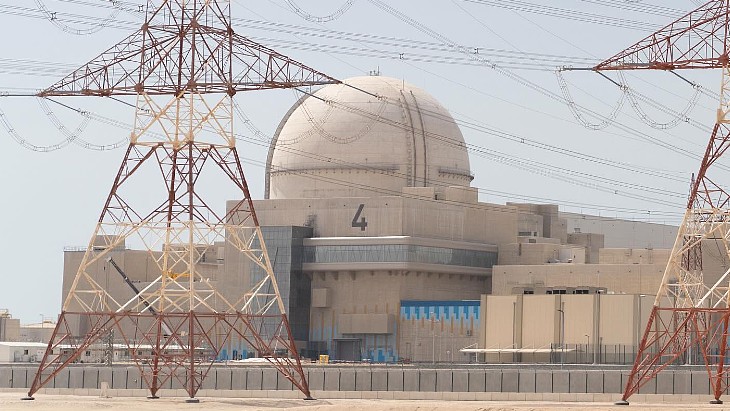The start-up of the unit means it is producing heat through nuclear fission. The heat produces steam which is used for generating electricity by turning a turbine and Emirates Nuclear Energy Corporation (ENEC) said that "in the coming weeks, unit 4 will link to the national electricity grid, entering a testing phase to gradually increase its power output to full capacity".
Construction of the four Korean-designed APR-1400 units at Barakah began in 2012, with work on unit 4 beginning in 2015. Unit 1 began commercial operation in April 2021, unit 2 in March 2022. Unit 3's start-up was in September 2022, and it began commercial operation in February 2023.
The Federal Authority for Nuclear Regulation (FANR) in the UAE said that since it issued the operating licence in November it had continued its regulatory oversight and "the operator had met all regulatory requirements to initiate this phase".
ENEC said that each unit had started up more efficiently than the previous one, saying that unit 3 was delivered four months faster than unit 2 and five months faster than unit 1. When the fourth unit is in commercial operation, Barakah's four pressurised water reactors will be able to produce up to 5.6 GW, meeting about 25% of the UAE's electricity demand.
ENEC Managing Director and CEO, Mohamed Al Hammadi, said: "The start-up of the fourth unit ... is a significant achievement as we now enter into a new era to deliver the full promise of the Barakah plant. In the past five years, the UAE has added more clean electricity per capita than any other nation globally, with 75% coming solely from the Barakah plant, demonstrating how pivotal nuclear energy is in decarbonising the country’s power sector. The knowledge and expertise of our local teams positions us well ahead of the curve, setting the nation on a pioneering course towards sustainable economic and environmental prosperity. Our journey reflects a bold vision, coupled with rigorous standards of quality and safety, to effectively deploy civil nuclear energy as a proven, viable solution for tackling energy security and climate change."
The UAE embarked on its plan to implement a nuclear energy programme in 2008 when its government made the decision to build and operate a nuclear power plant to provide 25% of the country's electricity needs, diversifying its energy sources and supporting its long-term energy vision and net zero goals. The Barakah plant - in the Al Dhafra Region of Abu Dhabi - is owned by ENEC and operated by Nawah, a joint nuclear operations and maintenance subsidiary of the ENEC and the Korea Electric Power Corporation.
ENEC, which launched the Net Zero Nuclear initiative - to triple nuclear energy capacity by 2050 - with World Nuclear Association ahead of COP28 last year, says it plans to "expand the UAE’s nuclear energy sector by advancing research and development and adopting the latest nuclear energy technologies. This includes small modular reactors and advanced reactors to generate clean electrons and molecules, such as steam, hydrogen and ammonia, as well as providing process heat for various industries". It said it was working with local and international stakeholders to "identify technology and project collaboration opportunities to progress deployment pathways, which is crucial to decarbonise energy sources in pursuit of Net Zero 2050".
FANR said it would continue conducting its regulatory oversight and inspection "during this and subsequent phases including power grid synchronisation and full commercial operation, to continue to ensure the safety and security as part of its mission to protect the public, workers and environment".















